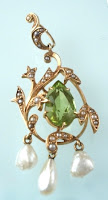All That Glitters
Gemstones and beautiful jewelry,
especially Art Nouveau. Like this Art
Nouveau peridot lavalier. Yum.
Diamonds and emeralds and
sapphires and a myriad of so-called semiprecious stones. Love, love, love.
So what about diamonds? I never really liked them much until I had a
class in how to identify and describe them.
All that glitter. All those
subtle characteristics. All that beauty!
Are diamonds really forever?
No.
Really?
Diamonds are very, very
hard. Diamonds are nearly impervious to
chemicals. It’s almost impossible to
scratch them in normal day-to-day life. But
they can be burned and they can be broken.
(Just one more reason to not have your house burn down. It won’t do that engagement ring any favors.)
It's hard to scratch a
diamond. Only another diamond can do it,
and only in certain directions on the stone.
It's hard to burn a diamond, but
it can be done. Even if your diamond
doesn’t go up in flames (very
unlikely), the stone will get ruined.
Trust me, a clear, sparkling diamond that has become opaque and white is
not pretty.
It’s possible to crush a diamond, and it's easy to break a diamond...if it's hit just right. Because of its atomic structure, diamond can be broken along certain planes in the stone. In The Olden Days, before the power-driven diamond saw blade, diamonds were shaped by cleaving. Diamond cutters, the grand poobahs of the industry, studied large stones for long periods of time before placing a chisel-like tool in the exactly right—they hoped—place and striking it with a small hammer. If they had calculated correctly, the stone split smoothly. Imagine the stress when, after a year of study, Joseph Asscher aimed his hammer at the world’s largest diamond, the 3,106 carat Cullinan. Check
out the story here:
(Be sure to scroll down to see
the picture of Asscher preparing to whack the stone. ☺ )
Jenny
P.S. On the writing front, Western Heroes: Grey is still under construction but progressing.


